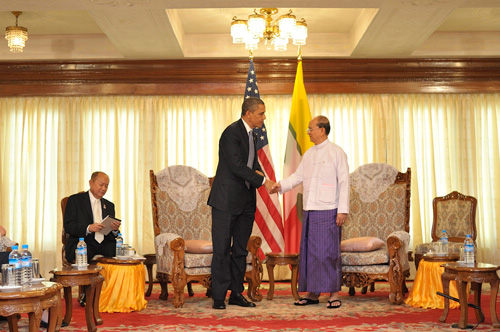|
 |
|
HISTORIC HANDSHAKE: Visiting U.S. President Barack Obama meets with Myanmar's President U Thein Sein in Yangon on November 19 (CFP) |
Reelected U.S. President Barack Obama paid a six-hour working visit to Myanmar on November 19. Chinese observers said the visit indicated the Obama administration will continue Washington's Asia policy from previous years, which the United States refers to as a "rebalance."
Renewed ties
Obama's Myanmar visit was a classic example of his diplomatic style of appearing amiable and easy-going. His true intention, however, is to encourage Myanmar to move forward with a democracy modeled after the United States, said Gao Zugui, a professor with the Institute for International Strategic Studies at the Party School of the Central Committee of the Communist Party of China.
Obama—the first sitting U.S. president to visit Myanmar—was accompanied by U.S. Secretary of State Hillary Clinton and Secretary of Defense Leon Panetta.
In Yangon, Obama met with his Myanmar counterpart U Thein Sein and parliamentarian Aung San Suu Kyi, leader of the opposition National League for Democracy. Obama said his discussion with U Thein Sein was a positive one, acknowledging the latter's reform measures, which he said will benefit the development of relations bilaterally, regionally and internationally. Obama praised U Thein Sein for confronting the use of child soldiers and nuclear non-proliferation. For the first time, Obama referred to the country as "Myanmar" rather than its previous name of "Burma."
"The change in his language reflected Obama's efforts to develop a more equal bilateral relationship," Gao Zugui noted.
Relations between Myanmar and the United States improved after elected President U Thein Sein initiated a series of reforms since taking office in March 2011, such as releasing hundreds of political prisoners, signing ceasefire agreements with several ethnic armed groups, and holding parliamentary by-elections on April 1 this year, in which Aung San Suu Kyi's party won a majority of the open parliamentary seats with Aung San Suu Kyi herself gaining a seat in the House of Representatives.
U Thein Sein and Aung San Suu Kyi's successive visits to the United States in September-October have opened a new chapter in bilateral ties since the reestablishment of diplomatic relations at the ambassadorial level on July 11 with Derek Mitchell, U.S. Special Representative and Policy Coordinator for Myanmar, assigned as the first U.S. ambassador to Myanmar in 22 years.
Furthermore, Washington offered an economic incentive to encourage the country's "democratic process," said Gao. Obama came to Yangon with an assistance project valued at $170 million. When Clinton visited Myanmar last year, she brought a deal worth $1.2 million. In May, the U.S. Treasury relaxed some sanctions on Myanmar to allow financial transactions to support certain humanitarian and development projects in the country.
Prior to Obama's visit, Washington announced a further easing of the sanctions, allowing U.S. companies to do business and invest in Myanmar's oil and gas sectors. Washington imposed sanctions on the Southeast Asian nation in May 1997, which were expanded over the years, under which U.S. investment and all imports from Myanmar were banned, assets of certain financial institutions in Myanmar frozen, and visa restrictions imposed on officials of the Myanmar Government. U.S. state and treasury departments said the move was taken to support ongoing reform efforts in Myanmar, encourage "further change" and offer new opportunities for businesses in both countries.
| 